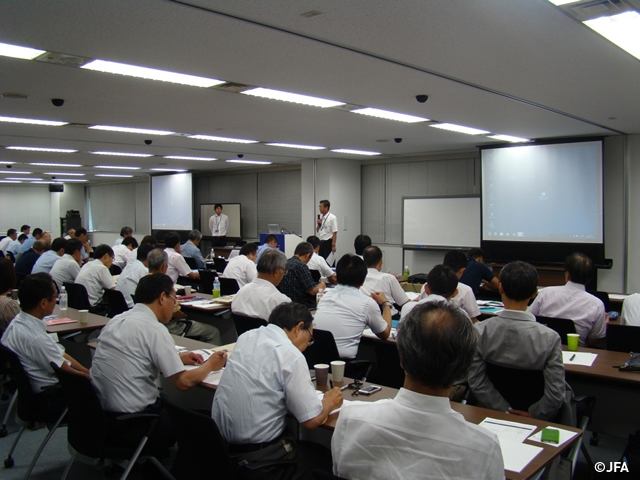NEWS
The second training session in 2014 for Class S and Class 1 instructors
13 July 2014

The training sessions for class S and Class 1 instructors were held on Saturday 5 July and Sunday 6 July at JFA House in Tokyo.
In this training, the theme was ‘externalization’, as I wanted to focus on making the process of understanding clear through talking and writing.
I introduced a universal style for the refereeing analysis, which used a new evaluation method in the FIFA format, so that any instructor can do refereeing analysis in the same way.
We also discussed how Class 1 instructors could understand the coaching method and improve it. Participating Class 1 instructors agreed with the united and clear coaching method, and wanted to try it in practice. I would like to spread this method from now on.
We analysed an actual J2 match to examine points of analysis and scores using the new formatted assessment report. We could calculate the analysis score from the difficulty level and the referee’s performance, as well as clarifying good points and issues to be fixed. The analysis had coherence and unity. Again we found another opportunity to realise through ‘externalization’.
Participant Comment
TANABE HIROSHI Class S Instructor (Yamaguchi)
I introduced the coaching method in the united format in the following order:
1. Understanding the situation
2. List of considerations
3. Analysing the situation
4. Recapping
5. The rules of the game
As for understanding the situation (1) and considerations (2), I asked the participants for their opinion and the way they look at the situation. For analysing the situation (3), we discussed a lot about good points and problems, which allowed them to learn better ways to react. By recapping (4) we reviewed and understood more about the theme and what we learned, followed by the rules (5), understanding the basis of what we’ve covered.
Exchanging opinions on the fixed theme works well for everyone: speakers have the opportunity to prepare and learn about things, and listeners can clarify the way they think. I felt that they would improve themselves even more.
I also think that the opportunity of contemplating things will help them to use the new formatted assessment report, giving them writing skills and problem-solving skills. I’d like to continue this in future referees’ training as well.
YANAGIMOTO Yoshifumi, Class 1 Instructor(Hokkaido)
In this training, we had a practical instruction using a unified format. By introducing this method, we can do the same training anywhere and it is expected to see the consistent improvement of referees and coaches.
WAKIYAMA TETSURO Class 1 Instructor (Saga)
The theme in this training was ‘externalization’. I found it difficult to express things logically, without ‘communicating telepathically’ or using ‘mutual understanding without words’, which are typically Japanese. I understood how important it is for referee instructors to communicate accurately, including the implementation of the new assessment report.
Related News
-
Referees
2014/06/18
J3 referee training held for 3rd time this year

-
Referees
2014/06/04
Futsal Class 1 referees and F league referees’ training sessions

-
Referees
2014/05/22
JFL Referee Training at Hasaki in Kamisu City, Ibaraki

-
Referees
2014/05/14
The 2nd J3 Referee Training held

-
Referees
2014/05/12
The 2nd JFL Referee Training held

Latest News
-
National Teams
2026/02/19
U-20 Japan Women's National Team short-listed squad & schedule - Training Camp (2/23-26@JFA YUME Field)

-
National Teams
2026/02/19
Japan Beach Soccer National Team short-listed squad & schedule - Training Camp (2/26-3/2@Okinawa)

-
National Teams
2026/02/12
U-17 Japan National Team squad & schedule - Prayer for Peace; Hiroshima International Youth Soccer Games 2025 (2/17-23@Hiroshima)

-
National Teams
2026/02/12
Nadeshiko Japan (Japan Women's National Team) squad & schedule - AFC Women's Asian Cup™ Australia 2026 (2/23-3/22)

-
National Teams
2026/02/09
U-16 Japan Women's National Team short-listed squad & schedule - Training Camp (2/16-19@Okayama)





